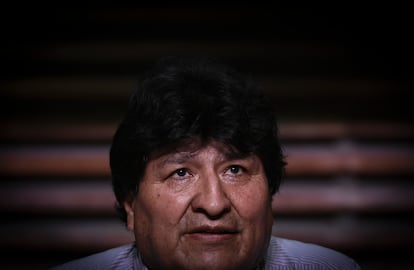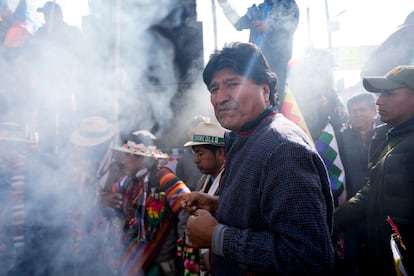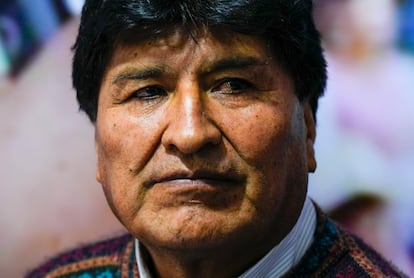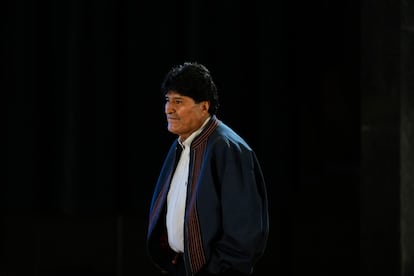The Evo Morales case: When sexual violence against women gets stuck in the political mud
Recent accusations of sexual abuse levied against the former president of Bolivia point to a pact of silence in service of the country’s political elite and a troubling history with the legal status of statutory rape

Evo Morales is holding a press conference in the Bolivian city of Cochabamba. He’s seated behind a bank of microphones, alongside his lawyer Nelson Cox, and is holding a sheath of papers. They are flanked by women leaders. Two rows of provincial assembly members and party members serve as their escort. For 20 minutes, he responds to accusations that have recently arisen pertaining to alleged aggravated statutory rape with incitement to prostitution, related to having sexually abused a 16-year-old girl in 2016. Bolivia’s former president reads his favorable polling results and calls the accusations part of a political strategy to disqualify him from the presidential race in 2025. “This campaign is so dirty, such a pack of lies. Everyone is after Evo because he is a winner,” he says before ending the presentation to a standing ovation from his followers.
“Evo, is it true that in 2016, you had a daughter with a 16-year-old girl?” asks a journalist of the 64-year-old politician.
Morales points at the media worker, and says, proudly, “Let me ask you, how many children do you have? […] You don’t mess with family. The family is sacred,” he insists. “This guy is going to ask me how many children I have and with how many women?” he laughs, bringing the press conference to a close as Cox and one of the women leaders join in the laughter. But it’s far from a private matter — the subject is making headlines in Bolivia. The father of the minor in question has been detained and there is a warrant out for the arrest of the former president, who has taken refuge at his home in Chapare. The country awaits legal advances in a case that appears to be mired in the political mud. In a nation where the age of consent is 14, the case is shining a spotlight on the crime of statutory rape, which is defined as when an adult has sexual relations with a minor above the age of legal consent, but without their legal consent, using trickery, blackmail or abuse of power. Even the Inter-American Court of Human Rights has doubts about its effectiveness, having requested that the distinction be repealed.
“The way in which men from the opposition and those in positions of authority have been addressing the subject of sexual violence against women is degrading,” says Bolivian sociologist Sonia Montaño. “Men from both sides have found it to be quite fertile ground, which stems from the conservative mentality that exists in Bolivia, even as we know they are beating us, killing us and sexually abusing us.”
This is not the first time that Morales, a politician who throughout his career has joked publicly about his predilection for underage women and who has faced other accusations of statutory rape, has become involved in a scandal that concerns his personal life. His two sons, born to different mothers in 1994 and 1995, had to wage a long-term campaign in order the former president to recognize his paternity.

Five accusations of sexual abuse of minors
Beginning with his first presidential term in 2006, Morales has racked up at least five accusations of having sexually abused minors. The most notorious case, which was seized upon by his political opponents, was that of Gabriela Zapata, with whom the official admits to having had a relationship. The woman wound up becoming a senior manager for the Chinese engineering firm CAMC, with which the Bolivian government signed multi-million-dollar contracts when the coca farmers’ leader was president. In 2016, he was accused of having left her while she was underage and pregnant.
In turn, Morales accused Zapata of having lied about having had his baby. After spending time in jail, she was absolved of the associated charges in April of this year, with the court citing a lack of evidence. “I want to denounce the fact that my former partner [Morales] always had an obsession with underage women, which is how he met me and managed, through trickery and false promises to my family, to get me to have a relationship with a person who was much older than me. I hope that the power that Evo still has does not allow him to remain unpunished before the laws of our country,” declared Zapata on October 3 on her Facebook page.
Following the 2019 electoral crisis, which resulted in the resignation and subsequent exile of Morales, first to Mexico and then Argentina, in 2020, images, text messages and even airplane tickets were leaked pointing to his having had a relationship with the 19-year-old Noemi N. Journalist Jon Lee Anderson mentions in his New Yorker article, The Fall of Evo Morales, that a young woman had accompanied the former president in Mexico. Jeanine Áñez’s interim government in Bolivia filed charges against Morales of statutory rape, sexual abuse, and trafficking of individuals. An investigation found that the connection between Morales and Noemi N. had begun five years previously, when she was 14 and the former official, 56. That same year, in 2020, the Áñez administration once again denounced Morales for a supposed relationship he had in 2015 with a 15-year-old girl, Cindy V., who he allegedly impregnated and eventually fathered her child at the age of 57. After Luis Arce’s electoral victory and the Movement for Socialism [MAS]’s return to power that year, both cases were resolved in Morales’ favor.
Four years later, amid an internal power struggle between Morales and his successor, the Cindy V. case is coming back to haunt the former president. On October 2, Tarija prosecutor Sandra Gutiérrez issued an arrest warrant for Morales on the charges of statutory rape with incitement to prostitution. No immediate action was taken because Gutiérrez was fired by her boss, Juan Lanchipa, a state attorney general who is close to Morales. The next day, Lanchipa announced he had made the decision based on the prosecutor’s “negligence,” rather than an attempt to protect the accused. According to the arrest warrant, between 2014 and 2015 and by “making inappropriate use of his status as president of the Plurinational State, [Morales] created a youth brigade made up of 14 and 15-year-olds named Evo Generation.” The document alleges that the teenager’s parents enrolled Cindy in the organization with the goal of “climbing up the political ladder” — that is to say, reaping benefits for themselves in exchange for their young daughter’s participation.
Cindy V.’s father, who was detained after failing to appear in court to answer the prosecutor’s charges, admitted in testimony — whose transcription was distributed by a legislator from a rival political party — that Morales got his daughter pregnant when she was underage. “It’s Evo Morales,” he says when interrogated as to the identity of his granddaughter’s father.
Then two more accusations of Morales having raped underage women were announced in Cochabamba by Tatiana Herrera, the director of the city’s office of gender. Herrera stated that the events in question took place in 2014 in the tropics of Cochabamba, the ex-president’s political stronghold. Morales has cast the allegations as a political attack, and called the accusations an attempt to “limit” his right to be a presidential candidate. On X, he dubbed the process a “new Operation Condor” through which, he says, his rivals “are promoting moral assassinations through charges against popular leaders.” EL PAÍS has contacted the former president to learn his version of the events, but had not received a response by press time.

A legacy of statutory rape
Beyond the political battle that has been unleashed by the allegations, the accusations have re-opened the debate surrounding the use of the concept of statutory rape, a crime that has been reported 7,181 times in Bolivia in the last four and a half years, according to data from the Public Ministry. Feminist organizations warn that the legal concept serves as cover for other, more serious kinds of rape, given that it carries a lower criminal penalty of only two to six years of imprisonment.
“There are many cases of rape that local law enforcement prefers to try as statutory rape,” says María Galindo from the feminist collective Mujeres Creando [Women Creating]. “To commit this crime, Evo Morales routinely used state infrastructure. The complicity [of authorities] has been intentional and clearly visible within the construction of a feudalism that justifies absolutely everything,” she says.
Jinky Irusta, from the Women’s Legal Office, says that the Inter-American Court of Human Rights requested the repeal of the figure of statutory rape after the organization found evidence that there were associated flaws and legal loopholes in the Bolivian legal system. That repeal has not been approved by the Bolivian legislature. The Inter-American Court’s request was made in the historic ruling of a case filed by Brisa Angulo, who was abused by her cousin when she was 16 years old and battled her way through the courts for two decades in search of justice. In 2022, the Inter-American Court finally determined that the Bolivian government had failed to protect the girl and had not properly defended her rights.
Irusta says that another problem lies in the fact that justice in these types of cases is often delayed by corruption. “Of the cases of gender-based violence that we handle at the Women’s Legal Office, there are many from seven, eight or 10 years ago that have not been resolved,” she says.
In part, according to several specialists, this is due to the fact that few state funds are set aside for prosecuting such crimes — currently, the amount is set at little more than $200,000, or 0.48% of the country’s budget. Potentially making matters worse, since 2009, Bolivia has elected high-level judges via popular vote. Critics say that there is a higher possibility of this system being “manipulated” in order to elect judges who are sympathetic to elected officials.
Galindo believes that many victims of sexual crimes fail to report them because they are subject to the social control of their communities and families. “Evo Morales didn’t dare to go up against the young women of middle-class urban professionals, but rather, felt he had impunity to take advantage of those from the Indigenous peasant movement, young people in search of change, of a life purpose, of a right to emancipate themselves from the parameters of their mothers’ lives,” says the activist.

The accusations that have been levied against Morales have wound up being batted about in a political boxing match in which women’s voices are seldom heard. A few days after the new allegations were announced, 24-year-old Jéssica Villarroel accused President Arce of having sexually abused her, and put pressure on her to abort their child. According to Villarroel, who announced the allegations alongside a legislator who is affiliated with Morales, she had a secret relationship with the official for half a year, starting when he offered her a position in his government and ending when she became pregnant. The president has not responded to her accusations of rape and abuse of power, though sources close to him have classified them as a “bad joke.”
As a sociologist, Montaño believes that political polarization and multiple accusations concerning the two most prominent leaders of MAS have weakened the feminist movement in Bolivia. “It’s true that Morales’s government was the first to achieve significant political participation of Indigenous women in a country that was much more racist and classist in the past. A parliament that featured a very small percentage of women and that was made up of the middle and upper classes was reconfigured with an increase of Indigenous women — and that is exactly what makes this so painful, because you thought that there had been a change,” she says.
The reactivation of the arrest warrant against the former president has led to threats from his followers to “burn” the country if he winds up in jail. And Morales, rather than contesting the accusations, insists that he is the only one capable of “saving Bolivia” from the crisis into which it has been thrust, all the while wrestling for the control of his party with President Arce. And in their political battles, women are being used as cannon fodder.
Sign up for our weekly newsletter to get more English-language news coverage from EL PAÍS USA Edition
Tu suscripción se está usando en otro dispositivo
¿Quieres añadir otro usuario a tu suscripción?
Si continúas leyendo en este dispositivo, no se podrá leer en el otro.
FlechaTu suscripción se está usando en otro dispositivo y solo puedes acceder a EL PAÍS desde un dispositivo a la vez.
Si quieres compartir tu cuenta, cambia tu suscripción a la modalidad Premium, así podrás añadir otro usuario. Cada uno accederá con su propia cuenta de email, lo que os permitirá personalizar vuestra experiencia en EL PAÍS.
¿Tienes una suscripción de empresa? Accede aquí para contratar más cuentas.
En el caso de no saber quién está usando tu cuenta, te recomendamos cambiar tu contraseña aquí.
Si decides continuar compartiendo tu cuenta, este mensaje se mostrará en tu dispositivo y en el de la otra persona que está usando tu cuenta de forma indefinida, afectando a tu experiencia de lectura. Puedes consultar aquí los términos y condiciones de la suscripción digital.









































